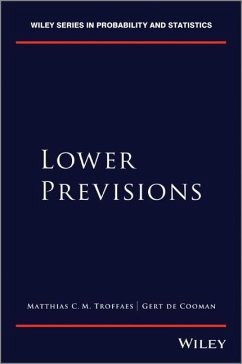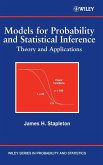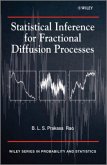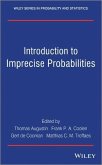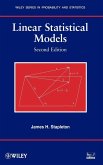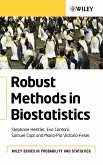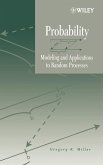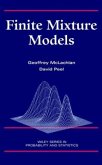- Gebundenes Buch
- Merkliste
- Auf die Merkliste
- Bewerten Bewerten
- Teilen
- Produkt teilen
- Produkterinnerung
- Produkterinnerung
This book has two main purposes. On the one hand, it provides a concise and systematic development of the theory of lower previsions, based on the concept of acceptability, in spirit of the work of Williams and Walley. On the other hand, it also extends this theory to deal with unbounded quantities, which abound in practical applications.
Following Williams, we start out with sets of acceptable gambles. From those, we derive rationality criteria---avoiding sure loss and coherence---and inference methods---natural extension---for (unconditional) lower previsions. We then proceed to study…mehr
Andere Kunden interessierten sich auch für
![Models for Probability and Statistical Inference Models for Probability and Statistical Inference]() James H. StapletonModels for Probability and Statistical Inference187,99 €
James H. StapletonModels for Probability and Statistical Inference187,99 €![Statistical Inference for Fractional Diffusion Processes Statistical Inference for Fractional Diffusion Processes]() B. L. S. Prakasa RaoStatistical Inference for Fractional Diffusion Processes111,99 €
B. L. S. Prakasa RaoStatistical Inference for Fractional Diffusion Processes111,99 €![Introduction to Imprecise Probabilities Introduction to Imprecise Probabilities]() Introduction to Imprecise Probabilities119,99 €
Introduction to Imprecise Probabilities119,99 €![Linear Statistical Models 2e Linear Statistical Models 2e]() James H. StapletonLinear Statistical Models 2e159,99 €
James H. StapletonLinear Statistical Models 2e159,99 €![Robust Methods in Biostatistics Robust Methods in Biostatistics]() Stephane HeritierRobust Methods in Biostatistics109,99 €
Stephane HeritierRobust Methods in Biostatistics109,99 €![Probability Probability]() Gregory K. MillerProbability224,99 €
Gregory K. MillerProbability224,99 €![Finite Mixture Models Finite Mixture Models]() Geoffrey McLachlanFinite Mixture Models202,99 €
Geoffrey McLachlanFinite Mixture Models202,99 €-
-
-
This book has two main purposes. On the one hand, it provides a
concise and systematic development of the theory of lower previsions,
based on the concept of acceptability, in spirit of the work of
Williams and Walley. On the other hand, it also extends this theory to
deal with unbounded quantities, which abound in practical
applications.
Following Williams, we start out with sets of acceptable gambles. From
those, we derive rationality criteria---avoiding sure loss and
coherence---and inference methods---natural extension---for
(unconditional) lower previsions. We then proceed to study various
aspects of the resulting theory, including the concept of expectation
(linear previsions), limits, vacuous models, classical propositional
logic, lower oscillations, and monotone convergence. We discuss
n-monotonicity for lower previsions, and relate lower previsions with
Choquet integration, belief functions, random sets, possibility
measures, various integrals, symmetry, and representation theorems
based on the Bishop-De Leeuw theorem.
Next, we extend the framework of sets of acceptable gambles to consider
also unbounded quantities. As before, we again derive rationality
criteria and inference methods for lower previsions, this time also
allowing for conditioning. We apply this theory to construct
extensions of lower previsions from bounded random quantities to a
larger set of random quantities, based on ideas borrowed from the
theory of Dunford integration.
A first step is to extend a lower prevision to random quantities that
are bounded on the complement of a null set (essentially bounded
random quantities). This extension is achieved by a natural extension
procedure that can be motivated by a rationality axiom stating that
adding null random quantities does not affect acceptability.
In a further step, we approximate unbounded random quantities by a
sequences of bounded ones, and, in essence, we identify those for
which the induced lower prevision limit does not depend on the details
of the approximation. We call those random quantities previsible . We
study previsibility by cut sequences, and arrive at a simple
sufficient condition. For the 2-monotone case, we establish a Choquet
integral representation for the extension. For the general case, we
prove that the extension can always be written as an envelope of
Dunford integrals. We end with some examples of the theory.
concise and systematic development of the theory of lower previsions,
based on the concept of acceptability, in spirit of the work of
Williams and Walley. On the other hand, it also extends this theory to
deal with unbounded quantities, which abound in practical
applications.
Following Williams, we start out with sets of acceptable gambles. From
those, we derive rationality criteria---avoiding sure loss and
coherence---and inference methods---natural extension---for
(unconditional) lower previsions. We then proceed to study various
aspects of the resulting theory, including the concept of expectation
(linear previsions), limits, vacuous models, classical propositional
logic, lower oscillations, and monotone convergence. We discuss
n-monotonicity for lower previsions, and relate lower previsions with
Choquet integration, belief functions, random sets, possibility
measures, various integrals, symmetry, and representation theorems
based on the Bishop-De Leeuw theorem.
Next, we extend the framework of sets of acceptable gambles to consider
also unbounded quantities. As before, we again derive rationality
criteria and inference methods for lower previsions, this time also
allowing for conditioning. We apply this theory to construct
extensions of lower previsions from bounded random quantities to a
larger set of random quantities, based on ideas borrowed from the
theory of Dunford integration.
A first step is to extend a lower prevision to random quantities that
are bounded on the complement of a null set (essentially bounded
random quantities). This extension is achieved by a natural extension
procedure that can be motivated by a rationality axiom stating that
adding null random quantities does not affect acceptability.
In a further step, we approximate unbounded random quantities by a
sequences of bounded ones, and, in essence, we identify those for
which the induced lower prevision limit does not depend on the details
of the approximation. We call those random quantities previsible . We
study previsibility by cut sequences, and arrive at a simple
sufficient condition. For the 2-monotone case, we establish a Choquet
integral representation for the extension. For the general case, we
prove that the extension can always be written as an envelope of
Dunford integrals. We end with some examples of the theory.
Produktdetails
- Produktdetails
- Wiley Series in Probability and Statistics
- Verlag: Wiley & Sons
- 1. Auflage
- Seitenzahl: 448
- Erscheinungstermin: Mai 2014
- Englisch
- Abmessung: 234mm x 161mm x 30mm
- Gewicht: 688g
- ISBN-13: 9780470723777
- ISBN-10: 0470723777
- Artikelnr.: 27787700
- Herstellerkennzeichnung
- Libri GmbH
- Europaallee 1
- 36244 Bad Hersfeld
- gpsr@libri.de
- Wiley Series in Probability and Statistics
- Verlag: Wiley & Sons
- 1. Auflage
- Seitenzahl: 448
- Erscheinungstermin: Mai 2014
- Englisch
- Abmessung: 234mm x 161mm x 30mm
- Gewicht: 688g
- ISBN-13: 9780470723777
- ISBN-10: 0470723777
- Artikelnr.: 27787700
- Herstellerkennzeichnung
- Libri GmbH
- Europaallee 1
- 36244 Bad Hersfeld
- gpsr@libri.de
Matthias Troffaes, Department of Mathematical Sciences, Durham University, UK Since gaining his PhD, Dr Troffaes has conducted research in Belgium and the US in imprecise probabilities, before becoming a lecturer in statistics at Durham. He has published papers in a variety of journals, and written two book chapters. Gert de Cooman, SYSTeMS Research Group, Ghent University, Belgium With many years' research and teaching experience, Professor de Cooman serves/has served on the Editorial Boards of many statistical journals. He has published over 40 journal articles, and is an editor of the Imprecise Probabilities Project. He has also written chapters for six books, and has co-edited four.
Preface xv
Acknowledgements xvii
1 Preliminary notions and definitions 1
1.1 Sets of numbers 1
1.2 Gambles 2
1.3 Subsets and their indicators 5
1.4 Collections of events 5
1.5 Directed sets and Moore-Smith limits 7
1.6 Uniform convergence of bounded gambles 9
1.7 Set functions, charges and measures 10
1.8 Measurability and simple gambles 12
1.9 Real functionals 17
1.10 A useful lemma 19
PART I LOWER PREVISIONS ON BOUNDED GAMBLES 21
2 Introduction 23
3 Sets of acceptable bounded gambles 25
3.1 Random variables 26
3.2 Belief and behaviour 27
3.3 Bounded gambles 28
3.4 Sets of acceptable bounded gambles 29
3.4.1 Rationality criteria 29
3.4.2 Inference 32
4 Lower previsions 37
4.1 Lower and upper previsions 38
4.1.1 From sets of acceptable bounded gambles to lower previsions 38
4.1.2 Lower and upper previsions directly 40
4.2 Consistency for lower previsions 41
4.2.1 Definition and justification 41
4.2.2 A more direct justification for the avoiding sure loss condition 44
4.2.3 Avoiding sure loss and avoiding partial loss 45
4.2.4 Illustrating the avoiding sure loss condition 45
4.2.5 Consequences of avoiding sure loss 46
4.3 Coherence for lower previsions 46
4.3.1 Definition and justification 46
4.3.2 A more direct justification for the coherence condition 50
4.3.3 Illustrating the coherence condition 51
4.3.4 Linear previsions 51
4.4 Properties of coherent lower previsions 53
4.4.1 Interesting consequences of coherence 53
4.4.2 Coherence and conjugacy 56
4.4.3 Easier ways to prove coherence 56
4.4.4 Coherence and monotone convergence 63
4.4.5 Coherence and a seminorm 64
4.5 The natural extension of a lower prevision 65
4.5.1 Natural extension as least-committal extension 65
4.5.2 Natural extension and equivalence 66
4.5.3 Natural extension to a specific domain 66
4.5.4 Transitivity of natural extension 67
4.5.5 Natural extension and avoiding sure loss 67
4.5.6 Simpler ways of calculating the natural extension 69
4.6 Alternative characterisations for avoiding sure loss, coherence, and
natural extension 70
4.7 Topological considerations 74
5 Special coherent lower previsions 76
5.1 Linear previsions on finite spaces 77
5.2 Coherent lower previsions on finite spaces 78
5.3 Limits as linear previsions 80
5.4 Vacuous lower previsions 81
5.5 {0, 1}-valued lower probabilities 82
5.5.1 Coherence and natural extension 82
5.5.2 The link with classical propositional logic 88
5.5.3 The link with limits inferior 90
5.5.4 Monotone convergence 91
5.5.5 Lower oscillations and neighbourhood filters 93
5.5.6 Extending a lower prevision defined on all continuous bounded gambles
98
6 n-Monotone lower previsions 101
6.1 n-Monotonicity 102
6.2 n-Monotonicity and coherence 107
6.2.1 A few observations 107
6.2.2 Results for lower probabilities 109
6.3 Representation results 113
7 Special n-monotone coherent lower previsions 122
7.1 Lower and upper mass functions 123
7.2 Minimum preserving lower previsions 127
7.2.1 Definition and properties 127
7.2.2 Vacuous lower previsions 128
7.3 Belief functions 128
7.4 Lower previsions associated with proper filters 129
7.5 Induced lower previsions 131
7.5.1 Motivation 131
7.5.2 Induced lower previsions 133
7.5.3 Properties of induced lower previsions 134
7.6 Special cases of induced lower previsions 138
7.6.1 Belief functions 139
7.6.2 Refining the set of possible values for a random variable 139
7.7 Assessments on chains of sets 142
7.8 Possibility and necessity measures 143
7.9 Distribution functions and probability boxes 147
7.9.1 Distribution functions 147
7.9.2 Probability boxes 149
8 Linear previsions, integration and duality 151
8.1 Linear extension and integration 153
8.2 Integration of probability charges 159
8.3 Inner and outer set function, completion and other extensions 163
8.4 Linear previsions and probability charges 166
8.5 The S-integral 168
8.6 The Lebesgue integral 171
8.7 The Dunford integral 172
8.8 Consequences of duality 177
9 Examples of linear extension 181
9.1 Distribution functions 181
9.2 Limits inferior 182
9.3 Lower and upper oscillations 183
9.4 Linear extension of a probability measure 183
9.5 Extending a linear prevision from continuous bounded gambles 187
9.6 Induced lower previsions and random sets 188
10 Lower previsions and symmetry 191
10.1 Invariance for lower previsions 192
10.1.1 Definition 192
10.1.2 Existence of invariant lower previsions 194
10.1.3 Existence of strongly invariant lower previsions 195
10.2 An important special case 200
10.3 Interesting examples 205
10.3.1 Permutation invariance on finite spaces 205
10.3.2 Shift invariance and Banach limits 208
10.3.3 Stationary random processes 210
11 Extreme lower previsions 214
11.1 Preliminary results concerning real functionals 215
11.2 Inequality preserving functionals 217
11.2.1 Definition 217
11.2.2 Linear functionals 217
11.2.3 Monotone functionals 218
11.2.4 n-Monotone functionals 218
11.2.5 Coherent lower previsions 219
11.2.6 Combinations 220
11.3 Properties of inequality preserving functionals 220
11.4 Infinite non-negative linear combinations of inequality preserving
functionals 221
11.4.1 Definition 221
11.4.2 Examples 222
11.4.3 Main result 223
11.5 Representation results 224
11.6 Lower previsions associated with proper filters 225
11.6.1 Belief functions 225
11.6.2 Possibility measures 226
11.6.3 Extending a linear prevision defined on all continuous bounded
gambles 226
11.6.4 The connection with induced lower previsions 227
11.7 Strongly invariant coherent lower previsions 228
PART II EXTENDING THE THEORY TO UNBOUNDED GAMBLES 231
12 Introduction 233
13 Conditional lower previsions 235
13.1 Gambles 236
13.2 Sets of acceptable gambles 236
13.2.1 Rationality criteria 236
13.2.2 Inference 238
13.3 Conditional lower previsions 240
13.3.1 Going from sets of acceptable gambles to conditional lower
previsions 240
13.3.2 Conditional lower previsions directly 252
13.4 Consistency for conditional lower previsions 254
13.4.1 Definition and justification 254
13.4.2 Avoiding sure loss and avoiding partial loss 257
13.4.3 Compatibility with the definition for lower previsions on bounded
gambles 258
13.4.4 Comparison with avoiding sure loss for lower previsions on bounded
gambles 258
13.5 Coherence for conditional lower previsions 259
13.5.1 Definition and justification 259
13.5.2 Compatibility with the definition for lower previsions on bounded
gambles 264
13.5.3 Comparison with coherence for lower previsions on bounded gambles
264
13.5.4 Linear previsions 264
13.6 Properties of coherent conditional lower previsions 266
13.6.1 Interesting consequences of coherence 266
13.6.2 Trivial extension 269
13.6.3 Easier ways to prove coherence 270
13.6.4 Separate coherence 278
13.7 The natural extension of a conditional lower prevision 279
13.7.1 Natural extension as least-committal extension 280
13.7.2 Natural extension and equivalence 281
13.7.3 Natural extension to a specific domain and the transitivity of
natural extension 282
13.7.4 Natural extension and avoiding sure loss 283
13.7.5 Simpler ways of calculating the natural extension 285
13.7.6 Compatibility with the definition for lower previsions on bounded
gambles 286
13.8 Alternative characterisations for avoiding sure loss, coherence and
natural extension 287
13.9 Marginal extension 288
13.10 Extending a lower prevision from bounded gambles to conditional
gambles 295
13.10.1 General case 295
13.10.2 Linear previsions and probability charges 297
13.10.3 Vacuous lower previsions 298
13.10.4 Lower previsions associated with proper filters 300
13.10.5 Limits inferior 300
13.11 The need for infinity? 301
14 Lower previsions for essentially bounded gambles 304
14.1 Null sets and null gambles 305
14.2 Null bounded gambles 310
14.3 Essentially bounded gambles 311
14.4 Extension of lower and upper previsions to essentially bounded gambles
316
14.5 Examples 322
14.5.1 Linear previsions and probability charges 322
14.5.2 Vacuous lower previsions 323
14.5.3 Lower previsions associated with proper filters 323
14.5.4 Limits inferior 324
14.5.5 Belief functions 325
14.5.6 Possibility measures 325
15 Lower previsions for previsible gambles 327
15.1 Convergence in probability 328
15.2 Previsibility 331
15.3 Measurability 340
15.4 Lebesgue's dominated convergence theorem 343
15.5 Previsibility by cuts 348
15.6 A sufficient condition for previsibility 350
15.7 Previsibility for 2-monotone lower previsions 352
15.8 Convex combinations 355
15.9 Lower envelope theorem 355
15.10 Examples 358
15.10.1 Linear previsions and probability charges 358
15.10.2 Probability density functions: The normal density 359
15.10.3 Vacuous lower previsions 360
15.10.4 Lower previsions associated with proper filters 361
15.10.5 Limits inferior 361
15.10.6 Belief functions 362
15.10.7 Possibility measures 362
15.10.8 Estimation 365
Appendix A Linear spaces, linear lattices and convexity 368
Appendix B Notions and results from topology 371
B.1 Basic definitions 371
B.2 Metric spaces 372
B.3 Continuity 373
B.4 Topological linear spaces 374
B.5 Extreme points 374
Appendix C The Choquet integral 376
C.1 Preliminaries 376
C.1.1 The improper Riemann integral of a non-increasing function 376
C.1.2 Comonotonicity 378
C.2 Definition of the Choquet integral 378
C.3 Basic properties of the Choquet integral 379
C.4 A simple but useful equality 387
C.5 A simplified version of Greco's representation theorem 389
Appendix D The extended real calculus 391
D.1 Definitions 391
D.2 Properties 392
Appendix E Symbols and notation 396
References 398
Index 407
Acknowledgements xvii
1 Preliminary notions and definitions 1
1.1 Sets of numbers 1
1.2 Gambles 2
1.3 Subsets and their indicators 5
1.4 Collections of events 5
1.5 Directed sets and Moore-Smith limits 7
1.6 Uniform convergence of bounded gambles 9
1.7 Set functions, charges and measures 10
1.8 Measurability and simple gambles 12
1.9 Real functionals 17
1.10 A useful lemma 19
PART I LOWER PREVISIONS ON BOUNDED GAMBLES 21
2 Introduction 23
3 Sets of acceptable bounded gambles 25
3.1 Random variables 26
3.2 Belief and behaviour 27
3.3 Bounded gambles 28
3.4 Sets of acceptable bounded gambles 29
3.4.1 Rationality criteria 29
3.4.2 Inference 32
4 Lower previsions 37
4.1 Lower and upper previsions 38
4.1.1 From sets of acceptable bounded gambles to lower previsions 38
4.1.2 Lower and upper previsions directly 40
4.2 Consistency for lower previsions 41
4.2.1 Definition and justification 41
4.2.2 A more direct justification for the avoiding sure loss condition 44
4.2.3 Avoiding sure loss and avoiding partial loss 45
4.2.4 Illustrating the avoiding sure loss condition 45
4.2.5 Consequences of avoiding sure loss 46
4.3 Coherence for lower previsions 46
4.3.1 Definition and justification 46
4.3.2 A more direct justification for the coherence condition 50
4.3.3 Illustrating the coherence condition 51
4.3.4 Linear previsions 51
4.4 Properties of coherent lower previsions 53
4.4.1 Interesting consequences of coherence 53
4.4.2 Coherence and conjugacy 56
4.4.3 Easier ways to prove coherence 56
4.4.4 Coherence and monotone convergence 63
4.4.5 Coherence and a seminorm 64
4.5 The natural extension of a lower prevision 65
4.5.1 Natural extension as least-committal extension 65
4.5.2 Natural extension and equivalence 66
4.5.3 Natural extension to a specific domain 66
4.5.4 Transitivity of natural extension 67
4.5.5 Natural extension and avoiding sure loss 67
4.5.6 Simpler ways of calculating the natural extension 69
4.6 Alternative characterisations for avoiding sure loss, coherence, and
natural extension 70
4.7 Topological considerations 74
5 Special coherent lower previsions 76
5.1 Linear previsions on finite spaces 77
5.2 Coherent lower previsions on finite spaces 78
5.3 Limits as linear previsions 80
5.4 Vacuous lower previsions 81
5.5 {0, 1}-valued lower probabilities 82
5.5.1 Coherence and natural extension 82
5.5.2 The link with classical propositional logic 88
5.5.3 The link with limits inferior 90
5.5.4 Monotone convergence 91
5.5.5 Lower oscillations and neighbourhood filters 93
5.5.6 Extending a lower prevision defined on all continuous bounded gambles
98
6 n-Monotone lower previsions 101
6.1 n-Monotonicity 102
6.2 n-Monotonicity and coherence 107
6.2.1 A few observations 107
6.2.2 Results for lower probabilities 109
6.3 Representation results 113
7 Special n-monotone coherent lower previsions 122
7.1 Lower and upper mass functions 123
7.2 Minimum preserving lower previsions 127
7.2.1 Definition and properties 127
7.2.2 Vacuous lower previsions 128
7.3 Belief functions 128
7.4 Lower previsions associated with proper filters 129
7.5 Induced lower previsions 131
7.5.1 Motivation 131
7.5.2 Induced lower previsions 133
7.5.3 Properties of induced lower previsions 134
7.6 Special cases of induced lower previsions 138
7.6.1 Belief functions 139
7.6.2 Refining the set of possible values for a random variable 139
7.7 Assessments on chains of sets 142
7.8 Possibility and necessity measures 143
7.9 Distribution functions and probability boxes 147
7.9.1 Distribution functions 147
7.9.2 Probability boxes 149
8 Linear previsions, integration and duality 151
8.1 Linear extension and integration 153
8.2 Integration of probability charges 159
8.3 Inner and outer set function, completion and other extensions 163
8.4 Linear previsions and probability charges 166
8.5 The S-integral 168
8.6 The Lebesgue integral 171
8.7 The Dunford integral 172
8.8 Consequences of duality 177
9 Examples of linear extension 181
9.1 Distribution functions 181
9.2 Limits inferior 182
9.3 Lower and upper oscillations 183
9.4 Linear extension of a probability measure 183
9.5 Extending a linear prevision from continuous bounded gambles 187
9.6 Induced lower previsions and random sets 188
10 Lower previsions and symmetry 191
10.1 Invariance for lower previsions 192
10.1.1 Definition 192
10.1.2 Existence of invariant lower previsions 194
10.1.3 Existence of strongly invariant lower previsions 195
10.2 An important special case 200
10.3 Interesting examples 205
10.3.1 Permutation invariance on finite spaces 205
10.3.2 Shift invariance and Banach limits 208
10.3.3 Stationary random processes 210
11 Extreme lower previsions 214
11.1 Preliminary results concerning real functionals 215
11.2 Inequality preserving functionals 217
11.2.1 Definition 217
11.2.2 Linear functionals 217
11.2.3 Monotone functionals 218
11.2.4 n-Monotone functionals 218
11.2.5 Coherent lower previsions 219
11.2.6 Combinations 220
11.3 Properties of inequality preserving functionals 220
11.4 Infinite non-negative linear combinations of inequality preserving
functionals 221
11.4.1 Definition 221
11.4.2 Examples 222
11.4.3 Main result 223
11.5 Representation results 224
11.6 Lower previsions associated with proper filters 225
11.6.1 Belief functions 225
11.6.2 Possibility measures 226
11.6.3 Extending a linear prevision defined on all continuous bounded
gambles 226
11.6.4 The connection with induced lower previsions 227
11.7 Strongly invariant coherent lower previsions 228
PART II EXTENDING THE THEORY TO UNBOUNDED GAMBLES 231
12 Introduction 233
13 Conditional lower previsions 235
13.1 Gambles 236
13.2 Sets of acceptable gambles 236
13.2.1 Rationality criteria 236
13.2.2 Inference 238
13.3 Conditional lower previsions 240
13.3.1 Going from sets of acceptable gambles to conditional lower
previsions 240
13.3.2 Conditional lower previsions directly 252
13.4 Consistency for conditional lower previsions 254
13.4.1 Definition and justification 254
13.4.2 Avoiding sure loss and avoiding partial loss 257
13.4.3 Compatibility with the definition for lower previsions on bounded
gambles 258
13.4.4 Comparison with avoiding sure loss for lower previsions on bounded
gambles 258
13.5 Coherence for conditional lower previsions 259
13.5.1 Definition and justification 259
13.5.2 Compatibility with the definition for lower previsions on bounded
gambles 264
13.5.3 Comparison with coherence for lower previsions on bounded gambles
264
13.5.4 Linear previsions 264
13.6 Properties of coherent conditional lower previsions 266
13.6.1 Interesting consequences of coherence 266
13.6.2 Trivial extension 269
13.6.3 Easier ways to prove coherence 270
13.6.4 Separate coherence 278
13.7 The natural extension of a conditional lower prevision 279
13.7.1 Natural extension as least-committal extension 280
13.7.2 Natural extension and equivalence 281
13.7.3 Natural extension to a specific domain and the transitivity of
natural extension 282
13.7.4 Natural extension and avoiding sure loss 283
13.7.5 Simpler ways of calculating the natural extension 285
13.7.6 Compatibility with the definition for lower previsions on bounded
gambles 286
13.8 Alternative characterisations for avoiding sure loss, coherence and
natural extension 287
13.9 Marginal extension 288
13.10 Extending a lower prevision from bounded gambles to conditional
gambles 295
13.10.1 General case 295
13.10.2 Linear previsions and probability charges 297
13.10.3 Vacuous lower previsions 298
13.10.4 Lower previsions associated with proper filters 300
13.10.5 Limits inferior 300
13.11 The need for infinity? 301
14 Lower previsions for essentially bounded gambles 304
14.1 Null sets and null gambles 305
14.2 Null bounded gambles 310
14.3 Essentially bounded gambles 311
14.4 Extension of lower and upper previsions to essentially bounded gambles
316
14.5 Examples 322
14.5.1 Linear previsions and probability charges 322
14.5.2 Vacuous lower previsions 323
14.5.3 Lower previsions associated with proper filters 323
14.5.4 Limits inferior 324
14.5.5 Belief functions 325
14.5.6 Possibility measures 325
15 Lower previsions for previsible gambles 327
15.1 Convergence in probability 328
15.2 Previsibility 331
15.3 Measurability 340
15.4 Lebesgue's dominated convergence theorem 343
15.5 Previsibility by cuts 348
15.6 A sufficient condition for previsibility 350
15.7 Previsibility for 2-monotone lower previsions 352
15.8 Convex combinations 355
15.9 Lower envelope theorem 355
15.10 Examples 358
15.10.1 Linear previsions and probability charges 358
15.10.2 Probability density functions: The normal density 359
15.10.3 Vacuous lower previsions 360
15.10.4 Lower previsions associated with proper filters 361
15.10.5 Limits inferior 361
15.10.6 Belief functions 362
15.10.7 Possibility measures 362
15.10.8 Estimation 365
Appendix A Linear spaces, linear lattices and convexity 368
Appendix B Notions and results from topology 371
B.1 Basic definitions 371
B.2 Metric spaces 372
B.3 Continuity 373
B.4 Topological linear spaces 374
B.5 Extreme points 374
Appendix C The Choquet integral 376
C.1 Preliminaries 376
C.1.1 The improper Riemann integral of a non-increasing function 376
C.1.2 Comonotonicity 378
C.2 Definition of the Choquet integral 378
C.3 Basic properties of the Choquet integral 379
C.4 A simple but useful equality 387
C.5 A simplified version of Greco's representation theorem 389
Appendix D The extended real calculus 391
D.1 Definitions 391
D.2 Properties 392
Appendix E Symbols and notation 396
References 398
Index 407
Preface xv
Acknowledgements xvii
1 Preliminary notions and definitions 1
1.1 Sets of numbers 1
1.2 Gambles 2
1.3 Subsets and their indicators 5
1.4 Collections of events 5
1.5 Directed sets and Moore-Smith limits 7
1.6 Uniform convergence of bounded gambles 9
1.7 Set functions, charges and measures 10
1.8 Measurability and simple gambles 12
1.9 Real functionals 17
1.10 A useful lemma 19
PART I LOWER PREVISIONS ON BOUNDED GAMBLES 21
2 Introduction 23
3 Sets of acceptable bounded gambles 25
3.1 Random variables 26
3.2 Belief and behaviour 27
3.3 Bounded gambles 28
3.4 Sets of acceptable bounded gambles 29
3.4.1 Rationality criteria 29
3.4.2 Inference 32
4 Lower previsions 37
4.1 Lower and upper previsions 38
4.1.1 From sets of acceptable bounded gambles to lower previsions 38
4.1.2 Lower and upper previsions directly 40
4.2 Consistency for lower previsions 41
4.2.1 Definition and justification 41
4.2.2 A more direct justification for the avoiding sure loss condition 44
4.2.3 Avoiding sure loss and avoiding partial loss 45
4.2.4 Illustrating the avoiding sure loss condition 45
4.2.5 Consequences of avoiding sure loss 46
4.3 Coherence for lower previsions 46
4.3.1 Definition and justification 46
4.3.2 A more direct justification for the coherence condition 50
4.3.3 Illustrating the coherence condition 51
4.3.4 Linear previsions 51
4.4 Properties of coherent lower previsions 53
4.4.1 Interesting consequences of coherence 53
4.4.2 Coherence and conjugacy 56
4.4.3 Easier ways to prove coherence 56
4.4.4 Coherence and monotone convergence 63
4.4.5 Coherence and a seminorm 64
4.5 The natural extension of a lower prevision 65
4.5.1 Natural extension as least-committal extension 65
4.5.2 Natural extension and equivalence 66
4.5.3 Natural extension to a specific domain 66
4.5.4 Transitivity of natural extension 67
4.5.5 Natural extension and avoiding sure loss 67
4.5.6 Simpler ways of calculating the natural extension 69
4.6 Alternative characterisations for avoiding sure loss, coherence, and
natural extension 70
4.7 Topological considerations 74
5 Special coherent lower previsions 76
5.1 Linear previsions on finite spaces 77
5.2 Coherent lower previsions on finite spaces 78
5.3 Limits as linear previsions 80
5.4 Vacuous lower previsions 81
5.5 {0, 1}-valued lower probabilities 82
5.5.1 Coherence and natural extension 82
5.5.2 The link with classical propositional logic 88
5.5.3 The link with limits inferior 90
5.5.4 Monotone convergence 91
5.5.5 Lower oscillations and neighbourhood filters 93
5.5.6 Extending a lower prevision defined on all continuous bounded gambles
98
6 n-Monotone lower previsions 101
6.1 n-Monotonicity 102
6.2 n-Monotonicity and coherence 107
6.2.1 A few observations 107
6.2.2 Results for lower probabilities 109
6.3 Representation results 113
7 Special n-monotone coherent lower previsions 122
7.1 Lower and upper mass functions 123
7.2 Minimum preserving lower previsions 127
7.2.1 Definition and properties 127
7.2.2 Vacuous lower previsions 128
7.3 Belief functions 128
7.4 Lower previsions associated with proper filters 129
7.5 Induced lower previsions 131
7.5.1 Motivation 131
7.5.2 Induced lower previsions 133
7.5.3 Properties of induced lower previsions 134
7.6 Special cases of induced lower previsions 138
7.6.1 Belief functions 139
7.6.2 Refining the set of possible values for a random variable 139
7.7 Assessments on chains of sets 142
7.8 Possibility and necessity measures 143
7.9 Distribution functions and probability boxes 147
7.9.1 Distribution functions 147
7.9.2 Probability boxes 149
8 Linear previsions, integration and duality 151
8.1 Linear extension and integration 153
8.2 Integration of probability charges 159
8.3 Inner and outer set function, completion and other extensions 163
8.4 Linear previsions and probability charges 166
8.5 The S-integral 168
8.6 The Lebesgue integral 171
8.7 The Dunford integral 172
8.8 Consequences of duality 177
9 Examples of linear extension 181
9.1 Distribution functions 181
9.2 Limits inferior 182
9.3 Lower and upper oscillations 183
9.4 Linear extension of a probability measure 183
9.5 Extending a linear prevision from continuous bounded gambles 187
9.6 Induced lower previsions and random sets 188
10 Lower previsions and symmetry 191
10.1 Invariance for lower previsions 192
10.1.1 Definition 192
10.1.2 Existence of invariant lower previsions 194
10.1.3 Existence of strongly invariant lower previsions 195
10.2 An important special case 200
10.3 Interesting examples 205
10.3.1 Permutation invariance on finite spaces 205
10.3.2 Shift invariance and Banach limits 208
10.3.3 Stationary random processes 210
11 Extreme lower previsions 214
11.1 Preliminary results concerning real functionals 215
11.2 Inequality preserving functionals 217
11.2.1 Definition 217
11.2.2 Linear functionals 217
11.2.3 Monotone functionals 218
11.2.4 n-Monotone functionals 218
11.2.5 Coherent lower previsions 219
11.2.6 Combinations 220
11.3 Properties of inequality preserving functionals 220
11.4 Infinite non-negative linear combinations of inequality preserving
functionals 221
11.4.1 Definition 221
11.4.2 Examples 222
11.4.3 Main result 223
11.5 Representation results 224
11.6 Lower previsions associated with proper filters 225
11.6.1 Belief functions 225
11.6.2 Possibility measures 226
11.6.3 Extending a linear prevision defined on all continuous bounded
gambles 226
11.6.4 The connection with induced lower previsions 227
11.7 Strongly invariant coherent lower previsions 228
PART II EXTENDING THE THEORY TO UNBOUNDED GAMBLES 231
12 Introduction 233
13 Conditional lower previsions 235
13.1 Gambles 236
13.2 Sets of acceptable gambles 236
13.2.1 Rationality criteria 236
13.2.2 Inference 238
13.3 Conditional lower previsions 240
13.3.1 Going from sets of acceptable gambles to conditional lower
previsions 240
13.3.2 Conditional lower previsions directly 252
13.4 Consistency for conditional lower previsions 254
13.4.1 Definition and justification 254
13.4.2 Avoiding sure loss and avoiding partial loss 257
13.4.3 Compatibility with the definition for lower previsions on bounded
gambles 258
13.4.4 Comparison with avoiding sure loss for lower previsions on bounded
gambles 258
13.5 Coherence for conditional lower previsions 259
13.5.1 Definition and justification 259
13.5.2 Compatibility with the definition for lower previsions on bounded
gambles 264
13.5.3 Comparison with coherence for lower previsions on bounded gambles
264
13.5.4 Linear previsions 264
13.6 Properties of coherent conditional lower previsions 266
13.6.1 Interesting consequences of coherence 266
13.6.2 Trivial extension 269
13.6.3 Easier ways to prove coherence 270
13.6.4 Separate coherence 278
13.7 The natural extension of a conditional lower prevision 279
13.7.1 Natural extension as least-committal extension 280
13.7.2 Natural extension and equivalence 281
13.7.3 Natural extension to a specific domain and the transitivity of
natural extension 282
13.7.4 Natural extension and avoiding sure loss 283
13.7.5 Simpler ways of calculating the natural extension 285
13.7.6 Compatibility with the definition for lower previsions on bounded
gambles 286
13.8 Alternative characterisations for avoiding sure loss, coherence and
natural extension 287
13.9 Marginal extension 288
13.10 Extending a lower prevision from bounded gambles to conditional
gambles 295
13.10.1 General case 295
13.10.2 Linear previsions and probability charges 297
13.10.3 Vacuous lower previsions 298
13.10.4 Lower previsions associated with proper filters 300
13.10.5 Limits inferior 300
13.11 The need for infinity? 301
14 Lower previsions for essentially bounded gambles 304
14.1 Null sets and null gambles 305
14.2 Null bounded gambles 310
14.3 Essentially bounded gambles 311
14.4 Extension of lower and upper previsions to essentially bounded gambles
316
14.5 Examples 322
14.5.1 Linear previsions and probability charges 322
14.5.2 Vacuous lower previsions 323
14.5.3 Lower previsions associated with proper filters 323
14.5.4 Limits inferior 324
14.5.5 Belief functions 325
14.5.6 Possibility measures 325
15 Lower previsions for previsible gambles 327
15.1 Convergence in probability 328
15.2 Previsibility 331
15.3 Measurability 340
15.4 Lebesgue's dominated convergence theorem 343
15.5 Previsibility by cuts 348
15.6 A sufficient condition for previsibility 350
15.7 Previsibility for 2-monotone lower previsions 352
15.8 Convex combinations 355
15.9 Lower envelope theorem 355
15.10 Examples 358
15.10.1 Linear previsions and probability charges 358
15.10.2 Probability density functions: The normal density 359
15.10.3 Vacuous lower previsions 360
15.10.4 Lower previsions associated with proper filters 361
15.10.5 Limits inferior 361
15.10.6 Belief functions 362
15.10.7 Possibility measures 362
15.10.8 Estimation 365
Appendix A Linear spaces, linear lattices and convexity 368
Appendix B Notions and results from topology 371
B.1 Basic definitions 371
B.2 Metric spaces 372
B.3 Continuity 373
B.4 Topological linear spaces 374
B.5 Extreme points 374
Appendix C The Choquet integral 376
C.1 Preliminaries 376
C.1.1 The improper Riemann integral of a non-increasing function 376
C.1.2 Comonotonicity 378
C.2 Definition of the Choquet integral 378
C.3 Basic properties of the Choquet integral 379
C.4 A simple but useful equality 387
C.5 A simplified version of Greco's representation theorem 389
Appendix D The extended real calculus 391
D.1 Definitions 391
D.2 Properties 392
Appendix E Symbols and notation 396
References 398
Index 407
Acknowledgements xvii
1 Preliminary notions and definitions 1
1.1 Sets of numbers 1
1.2 Gambles 2
1.3 Subsets and their indicators 5
1.4 Collections of events 5
1.5 Directed sets and Moore-Smith limits 7
1.6 Uniform convergence of bounded gambles 9
1.7 Set functions, charges and measures 10
1.8 Measurability and simple gambles 12
1.9 Real functionals 17
1.10 A useful lemma 19
PART I LOWER PREVISIONS ON BOUNDED GAMBLES 21
2 Introduction 23
3 Sets of acceptable bounded gambles 25
3.1 Random variables 26
3.2 Belief and behaviour 27
3.3 Bounded gambles 28
3.4 Sets of acceptable bounded gambles 29
3.4.1 Rationality criteria 29
3.4.2 Inference 32
4 Lower previsions 37
4.1 Lower and upper previsions 38
4.1.1 From sets of acceptable bounded gambles to lower previsions 38
4.1.2 Lower and upper previsions directly 40
4.2 Consistency for lower previsions 41
4.2.1 Definition and justification 41
4.2.2 A more direct justification for the avoiding sure loss condition 44
4.2.3 Avoiding sure loss and avoiding partial loss 45
4.2.4 Illustrating the avoiding sure loss condition 45
4.2.5 Consequences of avoiding sure loss 46
4.3 Coherence for lower previsions 46
4.3.1 Definition and justification 46
4.3.2 A more direct justification for the coherence condition 50
4.3.3 Illustrating the coherence condition 51
4.3.4 Linear previsions 51
4.4 Properties of coherent lower previsions 53
4.4.1 Interesting consequences of coherence 53
4.4.2 Coherence and conjugacy 56
4.4.3 Easier ways to prove coherence 56
4.4.4 Coherence and monotone convergence 63
4.4.5 Coherence and a seminorm 64
4.5 The natural extension of a lower prevision 65
4.5.1 Natural extension as least-committal extension 65
4.5.2 Natural extension and equivalence 66
4.5.3 Natural extension to a specific domain 66
4.5.4 Transitivity of natural extension 67
4.5.5 Natural extension and avoiding sure loss 67
4.5.6 Simpler ways of calculating the natural extension 69
4.6 Alternative characterisations for avoiding sure loss, coherence, and
natural extension 70
4.7 Topological considerations 74
5 Special coherent lower previsions 76
5.1 Linear previsions on finite spaces 77
5.2 Coherent lower previsions on finite spaces 78
5.3 Limits as linear previsions 80
5.4 Vacuous lower previsions 81
5.5 {0, 1}-valued lower probabilities 82
5.5.1 Coherence and natural extension 82
5.5.2 The link with classical propositional logic 88
5.5.3 The link with limits inferior 90
5.5.4 Monotone convergence 91
5.5.5 Lower oscillations and neighbourhood filters 93
5.5.6 Extending a lower prevision defined on all continuous bounded gambles
98
6 n-Monotone lower previsions 101
6.1 n-Monotonicity 102
6.2 n-Monotonicity and coherence 107
6.2.1 A few observations 107
6.2.2 Results for lower probabilities 109
6.3 Representation results 113
7 Special n-monotone coherent lower previsions 122
7.1 Lower and upper mass functions 123
7.2 Minimum preserving lower previsions 127
7.2.1 Definition and properties 127
7.2.2 Vacuous lower previsions 128
7.3 Belief functions 128
7.4 Lower previsions associated with proper filters 129
7.5 Induced lower previsions 131
7.5.1 Motivation 131
7.5.2 Induced lower previsions 133
7.5.3 Properties of induced lower previsions 134
7.6 Special cases of induced lower previsions 138
7.6.1 Belief functions 139
7.6.2 Refining the set of possible values for a random variable 139
7.7 Assessments on chains of sets 142
7.8 Possibility and necessity measures 143
7.9 Distribution functions and probability boxes 147
7.9.1 Distribution functions 147
7.9.2 Probability boxes 149
8 Linear previsions, integration and duality 151
8.1 Linear extension and integration 153
8.2 Integration of probability charges 159
8.3 Inner and outer set function, completion and other extensions 163
8.4 Linear previsions and probability charges 166
8.5 The S-integral 168
8.6 The Lebesgue integral 171
8.7 The Dunford integral 172
8.8 Consequences of duality 177
9 Examples of linear extension 181
9.1 Distribution functions 181
9.2 Limits inferior 182
9.3 Lower and upper oscillations 183
9.4 Linear extension of a probability measure 183
9.5 Extending a linear prevision from continuous bounded gambles 187
9.6 Induced lower previsions and random sets 188
10 Lower previsions and symmetry 191
10.1 Invariance for lower previsions 192
10.1.1 Definition 192
10.1.2 Existence of invariant lower previsions 194
10.1.3 Existence of strongly invariant lower previsions 195
10.2 An important special case 200
10.3 Interesting examples 205
10.3.1 Permutation invariance on finite spaces 205
10.3.2 Shift invariance and Banach limits 208
10.3.3 Stationary random processes 210
11 Extreme lower previsions 214
11.1 Preliminary results concerning real functionals 215
11.2 Inequality preserving functionals 217
11.2.1 Definition 217
11.2.2 Linear functionals 217
11.2.3 Monotone functionals 218
11.2.4 n-Monotone functionals 218
11.2.5 Coherent lower previsions 219
11.2.6 Combinations 220
11.3 Properties of inequality preserving functionals 220
11.4 Infinite non-negative linear combinations of inequality preserving
functionals 221
11.4.1 Definition 221
11.4.2 Examples 222
11.4.3 Main result 223
11.5 Representation results 224
11.6 Lower previsions associated with proper filters 225
11.6.1 Belief functions 225
11.6.2 Possibility measures 226
11.6.3 Extending a linear prevision defined on all continuous bounded
gambles 226
11.6.4 The connection with induced lower previsions 227
11.7 Strongly invariant coherent lower previsions 228
PART II EXTENDING THE THEORY TO UNBOUNDED GAMBLES 231
12 Introduction 233
13 Conditional lower previsions 235
13.1 Gambles 236
13.2 Sets of acceptable gambles 236
13.2.1 Rationality criteria 236
13.2.2 Inference 238
13.3 Conditional lower previsions 240
13.3.1 Going from sets of acceptable gambles to conditional lower
previsions 240
13.3.2 Conditional lower previsions directly 252
13.4 Consistency for conditional lower previsions 254
13.4.1 Definition and justification 254
13.4.2 Avoiding sure loss and avoiding partial loss 257
13.4.3 Compatibility with the definition for lower previsions on bounded
gambles 258
13.4.4 Comparison with avoiding sure loss for lower previsions on bounded
gambles 258
13.5 Coherence for conditional lower previsions 259
13.5.1 Definition and justification 259
13.5.2 Compatibility with the definition for lower previsions on bounded
gambles 264
13.5.3 Comparison with coherence for lower previsions on bounded gambles
264
13.5.4 Linear previsions 264
13.6 Properties of coherent conditional lower previsions 266
13.6.1 Interesting consequences of coherence 266
13.6.2 Trivial extension 269
13.6.3 Easier ways to prove coherence 270
13.6.4 Separate coherence 278
13.7 The natural extension of a conditional lower prevision 279
13.7.1 Natural extension as least-committal extension 280
13.7.2 Natural extension and equivalence 281
13.7.3 Natural extension to a specific domain and the transitivity of
natural extension 282
13.7.4 Natural extension and avoiding sure loss 283
13.7.5 Simpler ways of calculating the natural extension 285
13.7.6 Compatibility with the definition for lower previsions on bounded
gambles 286
13.8 Alternative characterisations for avoiding sure loss, coherence and
natural extension 287
13.9 Marginal extension 288
13.10 Extending a lower prevision from bounded gambles to conditional
gambles 295
13.10.1 General case 295
13.10.2 Linear previsions and probability charges 297
13.10.3 Vacuous lower previsions 298
13.10.4 Lower previsions associated with proper filters 300
13.10.5 Limits inferior 300
13.11 The need for infinity? 301
14 Lower previsions for essentially bounded gambles 304
14.1 Null sets and null gambles 305
14.2 Null bounded gambles 310
14.3 Essentially bounded gambles 311
14.4 Extension of lower and upper previsions to essentially bounded gambles
316
14.5 Examples 322
14.5.1 Linear previsions and probability charges 322
14.5.2 Vacuous lower previsions 323
14.5.3 Lower previsions associated with proper filters 323
14.5.4 Limits inferior 324
14.5.5 Belief functions 325
14.5.6 Possibility measures 325
15 Lower previsions for previsible gambles 327
15.1 Convergence in probability 328
15.2 Previsibility 331
15.3 Measurability 340
15.4 Lebesgue's dominated convergence theorem 343
15.5 Previsibility by cuts 348
15.6 A sufficient condition for previsibility 350
15.7 Previsibility for 2-monotone lower previsions 352
15.8 Convex combinations 355
15.9 Lower envelope theorem 355
15.10 Examples 358
15.10.1 Linear previsions and probability charges 358
15.10.2 Probability density functions: The normal density 359
15.10.3 Vacuous lower previsions 360
15.10.4 Lower previsions associated with proper filters 361
15.10.5 Limits inferior 361
15.10.6 Belief functions 362
15.10.7 Possibility measures 362
15.10.8 Estimation 365
Appendix A Linear spaces, linear lattices and convexity 368
Appendix B Notions and results from topology 371
B.1 Basic definitions 371
B.2 Metric spaces 372
B.3 Continuity 373
B.4 Topological linear spaces 374
B.5 Extreme points 374
Appendix C The Choquet integral 376
C.1 Preliminaries 376
C.1.1 The improper Riemann integral of a non-increasing function 376
C.1.2 Comonotonicity 378
C.2 Definition of the Choquet integral 378
C.3 Basic properties of the Choquet integral 379
C.4 A simple but useful equality 387
C.5 A simplified version of Greco's representation theorem 389
Appendix D The extended real calculus 391
D.1 Definitions 391
D.2 Properties 392
Appendix E Symbols and notation 396
References 398
Index 407

